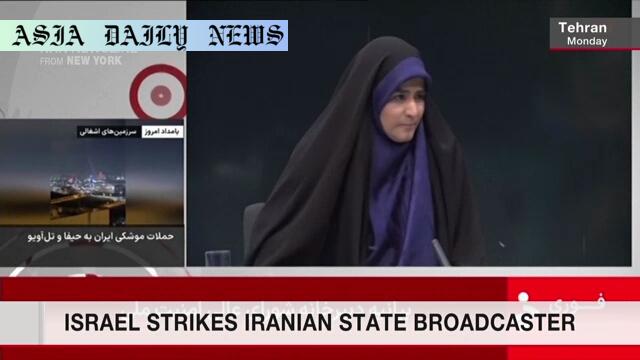Israel-Iran Conflict: An Israeli strike targeted Iranian state broadcaster facilities, intensifying the escalating war.
- Israeli forces targeted Iranian state broadcaster facilities for alleged military usage.
- The conflict has resulted in over 200 Iranian casualties and 370 missiles launched.
- Global leaders, including US President Trump, urge de-escalation and diplomacy.

Intense Escalation in Israel-Iran Conflict
The conflict between Israel and Iran has taken a severe turn, with destructive strikes and mounting casualties on both sides. On Monday, an Israeli military strike directly targeted the Iranian state-run broadcasting facilities in Tehran. Israeli officials stated that this facility was being utilized as a ‘communication center’ for military objectives. Explosive footage broadcasted by Iranian media during the strike underscored the chaos, showing presenters fleeing amidst rising dust and debris.
The Israeli Defense Forces (IDF) further revealed that their operations have taken out four senior Iranian intelligence figures and destroyed over 120 missile launchers, reportedly depleting around one-third of Iran’s missile reserves. This follows Israel’s warning to evacuate parts of Tehran, particularly densely populated regions.
The Growing Toll From Ongoing Hostilities
The Iranian health ministry has reported grim statistics from this intensifying confrontation. Over 1,800 citizens have been injured and 200 have been reported dead, with a majority of these being civilians. The scars of these assaults are visible across residential neighborhoods, adding to the rising humanitarian crisis. Meanwhile, Iran has launched retaliatory attacks, with more than 370 missiles fired toward Israel. Of these, the Israeli government has stated that 30 managed to make an impact, resulting in 24 casualties and approximately 600 injuries among Israelis.
Amidst rising tension, Iran’s Revolutionary Guards issued a stern warning to residents in Tel Aviv, urging them to evacuate. A senior Iranian official reinforced the country’s preparedness for a ‘full-scale war,’ signifying a potentially broader and deadlier escalation.
Calls for Diplomacy Amid Global Concern
Global reactions to the crisis have been swift. U.S. President Donald Trump emphasized the necessity for immediate dialogue. Speaking at the G7 Summit in Canada, Trump urged both parties to ‘make a deal’ before the situation worsens beyond repair. Despite drafting documents aimed at promoting de-escalation, reports suggest Trump has not officially endorsed the measures proposed by fellow G7 leaders.
The unfolding events represent a sharp escalation in the long-standing tensions between Israel and Iran. As missile exchanges grow more frequent and the death toll rises, there are increasing calls from international communities for restraint and diplomacy. However, both nations’ hardline stances may hinder immediate resolutions to the crisis.
It remains imperative for mediators to step up efforts towards negotiations. The global community’s role in peaceful conflict resolution has never been more crucial as countless lives hang in the balance.



Commentary
The Human Cost of War
The ongoing conflict between Israel and Iran underscores the devastating human toll of warfare. Civilians are often caught in the crossfire, bearing the brunt of destruction and loss. Reports of over 200 Iranian and 24 Israeli deaths, coupled with thousands injured, highlight the indiscriminate nature of modern warfare. The footage of terrified individuals seeking safety amidst missile strikes is a stark reminder of the war’s impact on everyday lives.
The Need for De-Escalation
As tensions rise, it becomes increasingly apparent that neither side truly benefits from prolonged conflict. The loss of lives, economic hardship, and infrastructural devastation harm both nations and reverberate across the global stage. A commitment to diplomacy, however difficult, serves as the only sustainable path to resolving such deep-seated tensions.
The Role of International Mediation
Global leaders, including U.S. President Donald Trump and the G7 Summit attendees, play a pivotal role in mediating this crisis. Their calls for dialogue reflect a shared responsibility to prevent further loss. However, rhetoric must translate into action—whether through establishing a ceasefire or facilitating negotiations.
The situation unfolding between Israel and Iran serves as a cautionary tale of how quickly conflicts can spiral out of control. It is a sobering reminder of the need for leaders to prioritize peace over power struggles. For the sake of all affected, one hopes that the calls for de-escalation are heeded, and meaningful progress toward resolution is achieved.